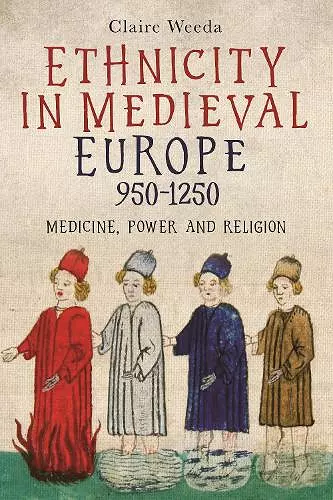Ethnicity in Medieval Europe, 950-1250
Medicine, Power and Religion
Format:Hardback
Publisher:York Medieval Press
Published:20th Aug '21
Should be back in stock very soon
This hardback is available in another edition too:
- Paperback£28.99(9781914049187)

An investigation into how racial stereotypes were created and used in the European Middle Ages. Students in twelfth-century Paris held slanging matches, branding the English drunkards, the Germans madmen and the French as arrogant. On crusade, army recruits from different ethnic backgrounds taunted each other's military skills. Men producing ethnography in monasteries and at court drafted derogatory descriptions of peoples dwelling in territories under colonisation, questioning their work ethic, social organisation, religious devotion and humanness. Monks listed and ruminated on the alleged traits of Jews, Saracens, Greeks, Saxons and Britons and their acceptance or rejection of Christianity. In this radical new approach to representations of nationhood in medieval western Europe, the author argues that ethnic stereotypes were constructed and wielded rhetorically to justify property claims, flaunt military strength and assert moral and cultural ascendance over others. The gendered images of ethnicity in circulation reflect a negotiation over self-representations of discipline, rationality and strength, juxtaposed with the alleged chaos and weakness of racialised others. Interpreting nationhood through a religious lens, monks and schoolmen explained it as scientifically informed by environmental medicine, an ancient theory that held that location and climate influenced the physical and mental traits of peoples. Drawing on lists of ethnic character traits, school textbooks, medical treatises, proverbs, poetry and chronicles, this book shows that ethnic stereotypes served as rhetorical tools of power, crafting relationships within communities and towards others.
This book will [...] be of great use to scholars interested in examining the engagement of Celtic- speaking scholars with certain intellectual trends of the central Middle Ages. -- CAMBRIAN MEDIEVAL CELTIC STUDIES
The importance and significance of Weeda's work lies [..] in the gathering of appropriate source material, its efficient analysis, and the neat and sensible presentation of problems [..]. -- QUAESTIONES MEDII AEVI NOVAE
Weeda's book is a fresh and exciting account of how Europeans formed representations of nationhood through ethnic and racial stereotypes. It covers an enormous field of studies with ease, synthesizing less-known texts into a compelling narrative of how racial ideas served as tools for medieval European writers, teachers, students, military commanders, and states. In the last few months, I have consulted and cited this book innumerable times, suggesting that it will hold an important place on my shelf for years to come. -- Erik Wade * The Medieval Review *
Weeda's study offers a compelling account of how Europeans imagined the nation, that is, a distinctive, cohesive ethnic group who dwelt within and indeed was produced by a particular territory, in the period 950-1250. Her book therefore offers a subtle, thoughtful account of notions of ethnicity, their roots in religious, intellectual, and medico-scientific ideas, and provides a suggestive indication of their later significance both in the development of European history and Europeans' future role in colonisation and the slave trade. -- Neil Tarrant * Journal of Religious History *
Weeda is to be highly commended for a great command of her materials and thoughtful ideas about the representations of ethnicity and their links to environmental determinism, and the religious and political ramifications of these concepts in the central Middle Ages. * MEDIEVAL ARCHAEOLOGY *
L'ouvrage très documenté de C. Weeda fourmille d'exemples et renvoie à une bibliographie complète et classée: sources primaires manuscrites et imprimées, puis références secondaires. Un catalogue des listes ethniques classé chronologiquement et un index complètent efficacement la publication. L'annexe permet en effet un accès direct à ces sources documentaires peu exploitées. " (The well-documented work by C. Weeda is brimming with examples and includes a comprehensive and organized bibliography, consisting of primary sources (both manuscript and printed) followed by secondary references. A chronological catalog of ethnic lists and an index effectively complement the publication. The appendix provides direct access to these underutilized documentary sources.) * CAHIERS DE CIVILISATION MÉDIÉVALE *
ISBN: 9781914049019
Dimensions: unknown
Weight: 456g
356 pages